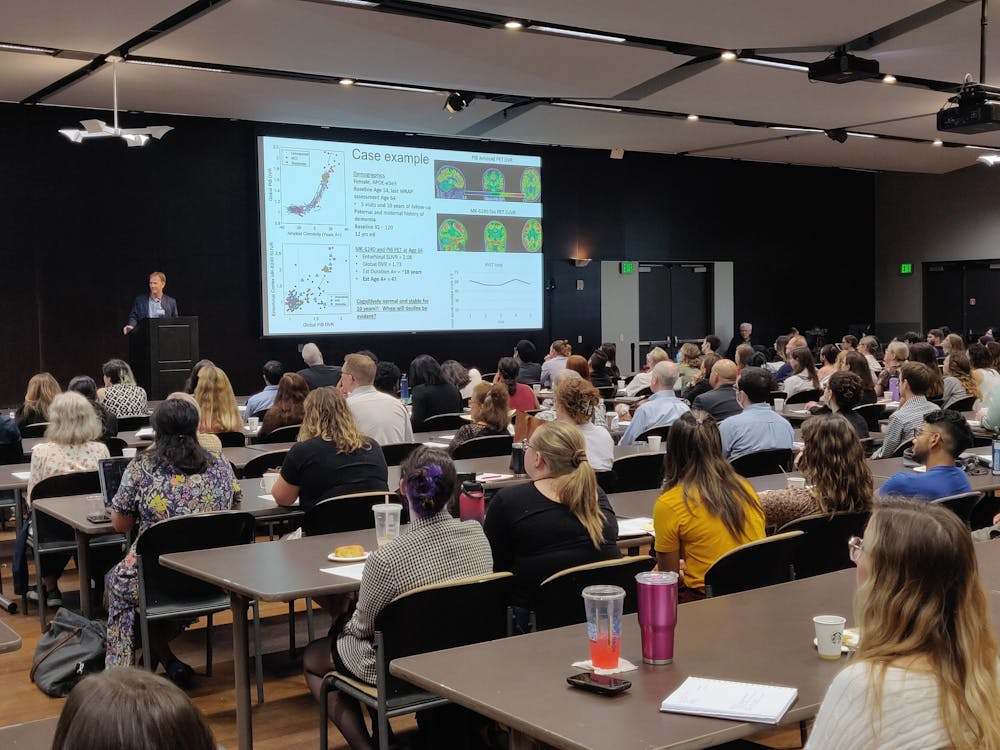ASU researchers have expanded the knowledge of Alzheimer’s disease and how to prevent it, from supplementing vitamin-like substances and aerobic exercise to intervene in progression of the disease, to improving the mental health of those who care for people living with it.
To share their findings on Alzheimer's disease, a progressive, irreversible neurological disorder and the most common form of dementia, ASU researchers gathered at the Arizona Alzheimer's Consortium Conference that was held on Sept. 22 at the Memorial Union on the Tempe campus.
Alzheimer's disease was the sixth leading cause of death in Arizona in 2020, according to the Centers for Disease Control and Prevention. Over 150,000 Arizonans age 65 or older had Alzheimer’s in 2020, a number that is expected to rise to 200,000 by 2025, according to the Alzheimer's Association’s 2022 Alzheimer’s Disease Facts and Figures.
Some postgraduate students come to ASU to study Alzheimer's disease, including Abigail Gómez-Morales, a Ph.D. candidate studying gerontechnology, who is giving her upcoming dissertation on skill-building intervention for family caregivers or people with dementia.
After earning degrees in nursing and radiology from the University of Barcelona, Gómez-Morales moved around the globe before landing in Arizona in 2016. Gómez-Morales said she began working with ASU because of research opportunities.
“They have very strong research in geriatrics, like … dementia and the older population, they have (the) greatest school of nursing,” Gómez-Morales said.
Through volunteer work at the Edson College of Nursing and Health Innovation and spending time with Alzheimer's patients, Gómez-Morales found importance in looking at the well-being of their full-time caregivers. Gómez-Morales began volunteering with CarePRO, a program that specializes in improving mental health of primary caregivers of dementia and Alzheimer's disease patients.
Through this program, family caregivers had decreases in depressive symptoms, according to a presentation Gómez-Morales gave at the Arizona Alzheimer's Consortium Conference.
Gómez-Morales has further helped Alzheimer's disease patients and caregivers communicate better through virtual reality and augmented reality experiences by Embodied Labs. Caregivers are now able to better empathize with those with Alzheimer’s and other related neurological conditions to better understand how to care for them.
Other researchers were at the conference, including ASU researchers who have worked to prove the effectiveness of particular treatments for Alzheimer’s and dementia patients.
Fang Yu, a professor in the Edson College of Nursing and Health Innovation and Edson chair in dementia translational nursing science, has been researching how aerobic exercise, specifically on recumbent stationary bikes, can slow Alzheimer's progression.
In a study on the effects of aerobic exercise on cognitive decline for those with Alzheimer's disease and dementia, Yu concluded through MRI that the volume of the regions of the brain that mark a patient's state of cognition remained stable rather than declining through the intervention period of aerobic training.
"The goal when we engage in aerobic exercise, we hope, or at least I hope, to improve their aerobic fitness, which I believe underlines cognitive benefits," Yu said.
Savannah Tallino, a Ph.D. student in neuroscience who attended the conference, has been recently investigating whether adulthood supplementation of choline, a B-like vitamin, in mice populations is effective in reducing the progression of Alzheimer's for those with Down syndrome.
People with Down syndrome often go on to develop Alzheimer’s pathology, so the research for the conditions is interconnected, Tallino said.
Although there had been previous studies done on the positive effects that the introduction of choline to fetuses in utero has on neurodegenerative condition progression, Tallino and others investigated whether the introduction of choline supplementation would have the same effect on an adult subset of mice — the most commonly used mouse model of Down syndrome.
Tallino and her team are still analyzing the cellular data results from the mice. So far, their results showed that there were no significant changes in cognition in the adult-supplemented mice, but early intervention with choline is beneficial, Tallino said.
This was Tallino’s first time attending the conference, and she appreciated the breadth of topics covered by keynote speakers and student poster presentations.
"I mean, it was really cool to see the breadth of research that’s being done around here in Arizona," Tallino said. "So I really, I really like that to get sort of a feel for what other labs are doing."
Edited by Kaden Ryback, Wyatt Myskow, Sophia Balasubramanian and Greta Forslund.
Reach the reporter at greygartin@gmail.com and follow @greygartin on Twitter.
Like The State Press on Facebook and follow @statepress on Twitter.




